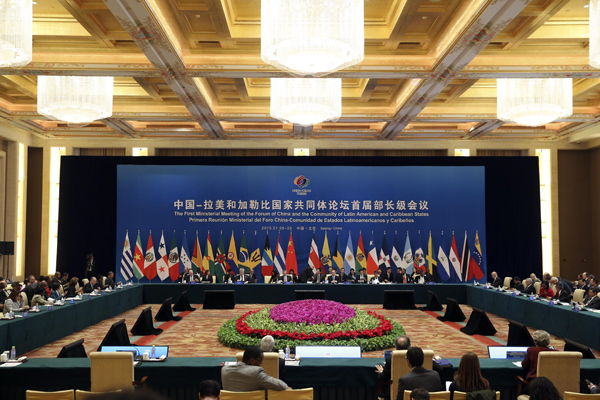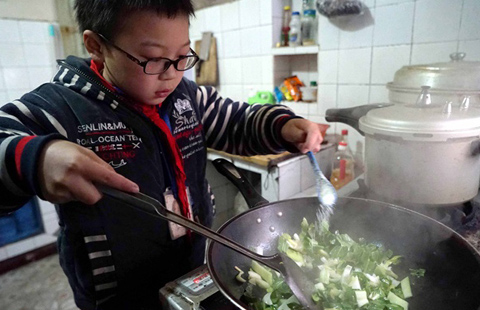China, LatAm upgrade cooperation
Updated: 2015-01-12 04:48
By JI YE in Rio de Janeiro(China Daily Latin America)
|
||||||||
 |
|
The First Ministerial Meeting of the Forum of China and the Community of Latin American and Caribbean States (CELAC) in Beijing on Jan 8. XINHUA / DING LIN |
With first ministerial meeting of the Forum of China and the Community of Latin American and Caribbean States (CELAC) in Beijing, the timing is right for China and Latin America to break new ground and promote cooperation.
China’s ambassador to Brazil and experts said that a new chapter for China-CELAC cooperation has been opened.
The meeting saw representatives from China and CELAC meet with heads of Latin American regional organizations.
Addressing the opening ceremony of the meeting on Jan 8, Chinese President Xi Jinping called on the two sides to seize new opportunities for cooperation while making proposals for the forum's future development.
Three major documents were passed: the Beijing Declaration, a five-year cooperation plan, and the regulations on the China-CELAC forum. China and CELAC also have reached a consensus on deepening political trust, expanding cooperation and promoting development of the forum.
Severino Cabral, director at the Brazil Institute of China and Asia Pacific Studies, said that Xi's speech set the course for building a broader and more flexible cooperation platform.
It would mobilize all Latin American and Caribbean countries to integrate themselves into global common development via their cooperation with China, and would mark a new epoch for development of China-CELAC relations as well as the world economy, Cabral said.
Li Jinzhang, China’s ambassador to Brazil, wrote in an article for the ministerial meeting that although China and Latin America are far apart geographically, similar historical destiny and development tasks bring them together.
Li pointed out that the Latin America/Caribbean region is one of the most concentrated areas for developing countries; therefore, China attaches great importance to developing relations with the region’s countries, which are an important basis for China's diplomacy.
Over the past decade, trade between China and Latin America has grown at 30 percent a year; trade volume between the two sides increased 20 times to $262 billion from 2002 to 2013.
“With the profound adjustment of the international situation, the acceleration of the Latin American integration and the further cooperation between China and Latin America, the bilateral relations enter into a mature period and face a rare opportunity,” Li said. “It’s the common aspiration for both sides to promote integrated cooperation and establish a new platform for cooperation.”
Francisco Barahonas, a political analyst and professor at the University of Costa Rica, said that CELAC is pursuing cooperation with China as an integral strategy.
Through cooperation in trade and economy, China and Latin American countries can realize mutual benefits and create job opportunities for CELAC members.
Amado Cervo, international relations professor at Brasilia University, said that China and Latin American and Caribbean countries have similar development aspirations, and their economies are highly complementary.
Cervo said that China and Latin America have embraced broader cooperation in areas such as technology, education, infrastructure, finance and investment.
As the largest country in population and territory in Latin America, Brazil is an important force in promoting the cooperation between China and Latin America. Brazil is China's ninth-largest trade partner worldwide and the largest in Latin America, while China has been Brazil's largest trade partner since 2009.
Brazil's economic transformation is centered around modernizing its industry and encouraging investment and construction of infrastructure.
"These are just the areas where China has accumulated a lot of experience," Cervo said.
Cervo said that economic ties between China and Brazil could go far beyond simple trade to include more joint ventures and investment, with Brazil craving Chinese funding for buildings and infrastructure. Chinese companies' relative wealth and experience can help compensate for the shortage of funding in Brazil.

 Time to become a woman
Time to become a woman
 The world in photos: Jan 5-11
The world in photos: Jan 5-11
 Belting out a tune for Beijing
Belting out a tune for Beijing
 66-year-old woman risks life, limb to pay off debt
66-year-old woman risks life, limb to pay off debt
 Tourists heat up Beijing's frozen lake
Tourists heat up Beijing's frozen lake
 72nd Golden Globe Awards
72nd Golden Globe Awards
 Marching in solidarity: Paris 'unity rally' in photos
Marching in solidarity: Paris 'unity rally' in photos
 We learn what is love from the 10-year-old schoolboy
We learn what is love from the 10-year-old schoolboy
Most Viewed
Editor's Picks

|

|

|

|

|

|
Today's Top News
Uber gets no grief yet in taxi-app ban
Washington's Chinatown in flux
Black box of crashed AirAsia jet retrieved
Experts praise reform of Chinese leaders, past and present
Ambitious course set for global airliner market
Chinese restaurants worry about cost of packaging ban
World leaders gather for Paris march
Better testing to secure safe blood supply
US Weekly

|

|







